Swiss welcome election of Abbas
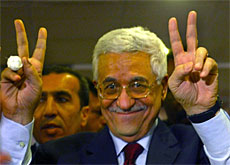
Switzerland has welcomed the election of Mahmoud Abbas as the new Palestinian president, calling Sunday’s vote an important step towards statehood.
The Swiss foreign ministry also called on Israelis and Palestinians to resume stalled peace talks.
The ministry said the vote had helped to consolidate democracy in the occupied territories.
It added that it hoped that upcoming local and parliamentary elections would further reinforce the democratic process.
The Swiss government has called on Israelis and Palestinians to take measures aimed at reducing violence, as previously agreed under the provisions of the so-called “road map” to peace drawn up by the United States, the European Union, Russia and the United Nations.
It also demanded that both sides respect international humanitarian law, a condition it considers essential for the resumption of cooperation and dialogue.
Monitoring the election
Mario Carera, head of the Swiss Agency for Development and Cooperation’s bureau in the occupied territories, said Sunday’s presidential election – called following the death of Palestinian leader Yasser Arafat – had met international standards.
“It was a good day for Palestine,” he said. “The election was transparent and democratic.”
Carera added that one black spot was the low turnout in East Jerusalem, where only a few thousand Palestinians were able to vote.
Rosemarie Zapfl, one of 13 Swiss parliamentary observers following the election, said the poll was fair.
“We could see that the Palestinians were motivated to choose their new leader,” she said.
Important vote
Peter Egloff, a long-time Swiss observer in the region working for the EU’s mission in the West Bank, told swissinfo that the vote was extremely important for Palestinians.
“It’s a way of showing the outside world that a Palestinian entity exists and can express itself,” he said. “After Arafat’s death, it was very important to find a successor, somebody who could represent them in the future.”
According to Egloff, the Palestinians welcomed the work conducted by international election observers.
“I think [our] presence was extremely well accepted, both by the Palestinian people as well as the authorities,” he said.
“People understood the purpose and possibilities of our mission, as well as its limitations, such as not being able to intervene in the electoral process.”
But Egloff, who has worked in the Middle East for over 20 years, warns that the election result is unlikely to be enough to ensure peace in the region.
“I’m not very optimistic, because you can still see the Israeli wall and the settlements still growing,” he said. “But of course, I hope I’m wrong.”
swissinfo with agencies
Mahmoud Abbas, also known as Abu Mazen, won the presidential election with over 60 per cent of the vote.
Independent candidate Mustapha Barghouti, who came in second, took less than 20 per cent.
The Israeli prime minister, Ariel Sharon, said Abbas would be judged on his capacity to “fight terrorism”.
The miliant Hamas and Islamic Jihad groups said they would cooperate with Abbas, but added that they would also pursue attacks against Israel.

In compliance with the JTI standards
More: SWI swissinfo.ch certified by the Journalism Trust Initiative
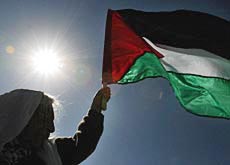
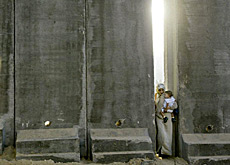
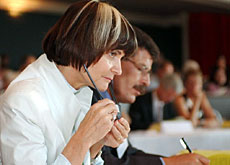
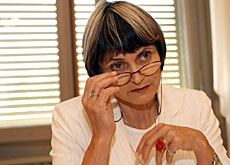
You can find an overview of ongoing debates with our journalists here. Please join us!
If you want to start a conversation about a topic raised in this article or want to report factual errors, email us at english@swissinfo.ch.